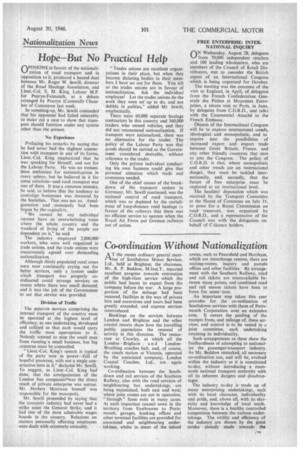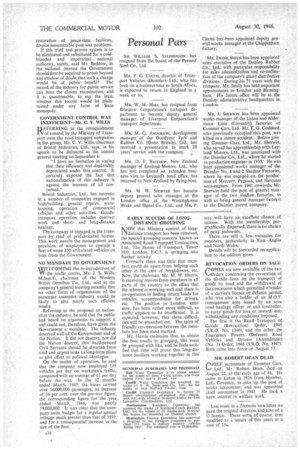Co-ordination Without Nationalization A T the recent ordinary general meetinging of
Page 25

Page 26

If you've noticed an error in this article please click here to report it so we can fix it.
Southdown Motor Services, Ltd., held at Brighton, the chairman. Mr. R. P. Beddow, M.Inst.T., reported excellent progress towards restoration of the high-class service which the public had learnt to expect from the company before the war. A large proportion of the mileage had been restored, facilities in the way of private hire and excursions and tours had been greatly extended, and express services reintroduced.
Bookings on the services between London and Brighton and the other coastal resorts show how the travelling public appreciates the renewal of activity in this direction. The restaurant at Crawley, at which all the
London Brighton . a n d LondonWorthing coaches halt, and, of course, the coach station at Victoria, operated by the associated company, London Coastal Coaches, Ltd., are again working.
Co-ordination between the Southdown and rail services of the Southern Railway, also with the road services of neighbouring bus undertakings, are being maintained, both east and west; where joint routes are not in operation, " through" fares exist in many cases. At each important coastal town in the territory from Eastbourne to Portsmouth, garages, booking offices and other terminal facilities are provided for associated and neighbouring undertakings, whilst in marts' of the inland towns, such as Petersfield and Horsham, which are interchange centres, there are waiting-rooms, inquiry and parcels offices and other facilities. By arrangement with the Southern Railway, road and rail tickets are interavailable between many points, and combined road and rail season tickets have been in force for some' time.
An important step taken this year provides for the co-ordination of Southdown services with those of Portsmouth Corporation over an extensive area. It covers the pooling of the receipts from, and mileage of, these services, and control is to be vested in a joint committee, each undertaking retaining its individuality.
Such arrangements as these show the foolhardiness of attempting to nationalize the passenger-transport industry. As Mr. Beddow remarked, all necessary co-ordination can, and will be, evolved within the industry as it is constituted to-day, without introducing a mammoth national transport authority with all its inherent dangers and disadvantages.
The industry to-day is made up of many enterprising undertakings, each with its local character, individuality and pride, and, above all, with its elasticity and knowledge of local needs. Moreover, there is a healthy controlled competition between the various undertakings. The virility and efficiency of the industry are shown by the great strides already made towards the restoration of xace-time facilities, despite innumerable post-war problems.
If this tried and proven system is to be eliminated and substituted for a coldblooded and impersonal national authority, surely, said Mr. Beddow, in the national interest the Government should first be required to prove beyond any shadow of doubt that such a change would be of public benefit? The record of the industry for public service can bear the closest examination, and it is questionable, to say the least, whether this record would be niaintained under any form of State monopoly.
GOVERNMENT CONTROL WAS INEFFICIENT—Mr. C. V. WILLS
REFERRING to the relinquishment of control by the Ministry of Transport over the road-transport companies in the group, Mr. C. V. Wills, chairman of Bristol Industries, Ltd., says, in his speech to be delivered at the annual general meeting on September 6:
"I have no hesitation in stating that their efficiency was deplorably depreciated under this control. It certainly exposed the fact that nationalization of this industry is against the interests of all concerned."
Bristol Industries, Ltd., has interests in a number of companies engaged in bodybuilding, general repairs, warehousing, operation of commercial vehicles and other activities. Goodstransport operation includes contract work and shortand long-distance haulage.
The company is engaged in the transport by road of prefabricated houses. This work entails the management and provision of employees to operate a fleet of some 350 articulated vehicles on loan from the Government.
NO MANDATE TO GOVERNMENT
VLCOMING the re-introduction of .he traffic courts, Mr. J. S. Wills, M.Inst.T., chairman of the Western Welsh Omnibus Co., Ltd., said at the company's general meeting recently that no other form of organization of the passenger transport industry would be likely to give nearly such efficient results.
Referring to the proposal to nationalize the industry, he said that the public had heard no arguments to support it and could not, therefore, have given the Government a mandate. The industry deserved well of the Government and of the Nation. It did not deserve, nor did the Nation deserve, that hard-pressed Civil Servants should be diverted from vital and urgent tasks to long-term plans to give effect to political ideologies.
On the matter of operation, he said that the company now employed 149 vehicles per day on workmen's traffic, compared with an average of 67 per day before the war. In the 12 months ended March, 1945, the buses carried over 56,000,000 passengers, an increase of 36 per cent. over the pre-war figure; the corresponding figure for the year ended March, 1946, was nearly 59,000,000. It was clear that the company must budget for a regular annual mileage much greater than that of 1939. and for a consequential increase in the size of the fleet.




































































